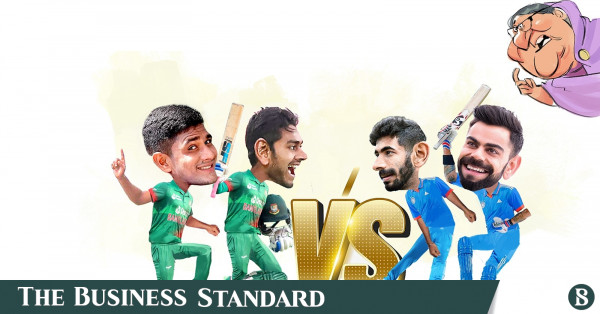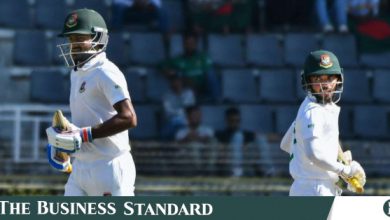Beyond the boundary: Cricket, politics, and the high-stakes India-Bangladesh showdown

The notion that sports exist solely within the bounds of the game is a well-worn sentiment, but it is seldom the truth. Sports has long been used as a stage for political theatre, and the India-Bangladesh series ahead will likely echo far beyond the boundary rope.
This contest stirs up emotions not just for cricketing reasons but for deeper, more complex motivations — where the weight of history, rivalry, and political tension will converge on a game where every run, every wicket, will carry significance beyond the sport itself.
India, ever the titan on home soil, enters the series as the undisputed favourite, a crown they wear with ease. But this time, a murmur of respect seems to be rippling toward Bangladesh, a respect earned, perhaps, by Bangladesh’s stunning conquest of Pakistan on their own turf.
Bangladesh’s victory, especially through the brilliance of their pace attack, sent a message across the cricketing world. While Pakistan may not be at their best, triumphing in their soil is no small feat, and a whitewash even less so. Though India may not tremble, they have surely taken note.
Yet, as with every battle, there are those quick to dismiss us. Sourav Ganguly, former Indian captain, has already attributed Bangladesh’s success to Pakistan’s declining talent pool, declaring that India offers no such luxury. His words, sharp as ever, will likely only add fuel to the fire once the players take to the field.
Bangladesh’s batsmen will face a sterner test—handling Jasprit Bumrah’s venom, the guile of Siraj, and the ever-enigmatic duo of Ashwin and Jadeja. Indian wickets, with their unpredictable bounce and spin, are never an easy playground.
But where there’s doubt, there’s also hope. Litton Das, often a thorn in India’s side, comes off the back of a career-defining series against Pakistan. He has spoken of taking on more responsibility, and if he can carry that form into this series, Bangladesh may avoid the humiliations of previous tours.
Alongside him, veterans like Mushfiqur Rahim, Mominul Haque and Shadman Islam will seek to carry forward the momentum sparked against Pakistan.
Bangladesh’s hopes, however, may rest most heavily on Shakib Al Hasan’s shoulders. With years of experience playing in India, combined with his stellar form with the ball in recent series and in county cricket, Shakib is uniquely poised to counter India’s spin wizards.
If Mehidy Hasan Miraz can mirror his success from the Pakistan series, Bangladesh might just find themselves matching India’s spinners blow for blow.
But it is Bangladesh’s pace attack that now makes India pause. Taskin Ahmed, Hasan Mahmud, Nahid Rana, and Khaled Ahmed have crafted a formidable unit, earning the respect of opponents with every fierce delivery.
Bangladesh’s fast-bowling depth is such that even the absence of Ebadot Hossain and Shoriful Islam barely raises concern. The days of struggling to fill their shoes are behind them. Though India’s pace battery remains superior, Bangladesh’s bowlers have given their fans a reason to dream.
Captain Najmul Hossain Shanto carries that dream with confidence, declaring that his team will perform better than ever before on Indian soil.
Athar Ali Khan, former cricketer and revered commentator, agrees that India are the favourites but remains quietly optimistic: “India’s squad is one of the strongest, if not the best, in the world. This will likely be Bangladesh’s toughest series, but India cannot afford to underestimate us.”
Athar, ever the believer, sees history in the making: “The confidence we gained from beating Pakistan could fuel us to do something extraordinary. India may look invincible on paper, but cricket is played on the field. We’re aiming for greatness, and with momentum on our side, anything is possible.”
While Ganguly may scoff, Harsha Bhogle, another voice of reason in Indian commentary, praises this Bangladesh side, calling it the best Test team he’s seen from them in a long time, I genuinely believe this is the best Test team I have seen from them [Bangladesh] for a very, very long time.”
Bhogle singles out the pacers for praise and offers respect to Bangladesh’s batting line-up, though he knows the challenge ahead is daunting.
Shanto, too, is clear-eyed about the task, stating that his goal is to take India to the final session of the fifth day: “If we can play well for five days, the match will be decided in the last session, and we will have our chance.”
For Bangladesh, this series holds more weight than simply cricketing glory. The performance of this team could decide the future of Chandika Hathurusingha, whose tenure as head coach has been under scrutiny.
BCB President Faruque Ahmed had hinted at his departure before the Pakistan series, but after the unexpected success in Pakistan, that decision may hang in the balance.
Should Bangladesh perform better than expected in India, will Hathurusingha’s fate change? Despite his critics, his record remains unmatched in Bangladesh’s history, and his impact on their recent success cannot be denied.
Yet, beyond the boundary lies the deeper tension—the political dimension that shadows this series. Since Sheikh Hasina’s resignation and flight to India, relations between the two nations have cooled, to say the least.
India, once closely allied with the previous government, now watches Bangladesh’s evolving political landscape with uncertainty. Tensions over dams, Bangladesh’s ban on hilsa exports to India, killings in the border, accusations of attacks on the Hindu minorities in Bangladesh and other simmering disputes create a backdrop of unease.
Cricket, in this context, becomes more than a game; it becomes a stage for political posturing.
Former ambassador M Humayun Kabir says he senses what he calls an “adjustment or understanding gap” between the two countries, and the pending question of extraditing the former PM will complicate things.
“Yes, there might be some stress in the bilateral relations between Bangladesh and India because of India’s special relationship with Sheikh Hasina,” he said.
Pakistan, too, is part of this tangled web. As protests in Bangladesh gained momentum, Pakistan expressed solidarity, with their people taking to the streets in support. The bond between Bangladesh and Pakistan, both on and off the field, has not gone unnoticed by India. While Indian fans may have cheered Bangladesh’s victory over Pakistan, the warming relations between these two nations may leave India feeling uneasy.
As the series begins, the battle on the field will be fierce—Rohit Sharma and Virat Kohli’s bats against the fire and swing of Nahid Rana and Hasan Mahmud; Bumrah and Jadeja’s brilliance tested by Litton Das and Mushfiqur Rahim.
But it will be the drama beyond cricket that may truly define this series, drawing the world’s eyes to every move, every run, and every twist in the tale.
And perhaps, just perhaps, history will be made.





